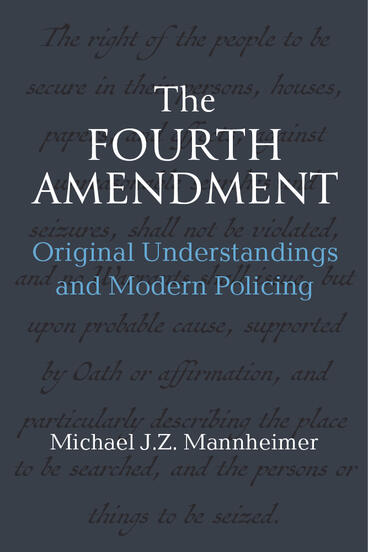The Fourth Amendment
Original Understandings and Modern Policing
Untangling how the Fourth and Fourteenth Amendments have influenced U.S. policing
Description
Police are required to obey the law. While that seems obvious, courts have lost track of that requirement due to misinterpreting the two constitutional provisions governing police conduct: the Fourth and Fourteenth Amendments. The Fourth Amendment forbids "unreasonable searches and seizures" and is the source of most constitutional constraints on policing. Although that provision technically applies only to the federal government, the Fourteenth Amendment, ratified in the wake of the Civil War, has been deemed to apply the Fourth Amendment to the States.
This book contends that the courts’ misinterpretation of these provisions has led them to hold federal and state law enforcement mistakenly to the same constitutional standards. The Fourth Amendment was originally understood as a federalism, or “states’ rights,” provision that, in effect, required federal agents to adhere to state law when searching or seizing. Thus, applying the same constraint to the States is impossible. Instead, the Fourteenth Amendment was originally understood in part as requiring that state officials (1) adhere to state law, (2) not discriminate, and (3) not be granted excessive discretion by legislators. These principles should guide judicial review of modern policing. Instead, constitutional constraints on policing are too strict and too forgiving at the same time. In this book, Michael J.Z. Mannheimer calls for a reimagination of what modern policing could look like based on the original understandings of the Fourth and Fourteenth Amendments.
Michael J.Z. Mannheimer is Professor of Law at Northern Kentucky University.
Reviews
“A new theory of the Fourth Amendment is born. Michael Mannheimer’s bracingly original understanding of the Fourth Amendment posits that the Framers saw it as necessarily tied to state law. He argues that courts should continue this interpretation. His defense of these propositions is utterly convincing.”
- George Thomas
—George Thomas, Rutgers Law School
“This book provides an historical, ‘originalist’ grounding for the view that the Fourth Amendment, together with the Fourteenth Amendment, requires that police searches and seizures in every state be authorized by law and be applied even-handedly, but that otherwise state law, not federal constitutional law, should govern police investigations. No other author has as masterfully tied together the federalist underpinnings of the Fourth Amendment, the anti-discrimination aspects of the Fourteenth Amendment, and modern scholarship about the role democracy should play in regulating the police. This book will provoke not only new scholarship but innovative legal arguments in an era when the Supreme Court is increasingly interested in originalist interpretations.”
- Christopher Slobogin
—Christopher Slobogin, Milton Underwood Professor of Law, Vanderbilt University
"Mannheimer's use of landmark cases throughout history, such as Terry v. Ohio, Royer v. Florida, Tennessee v. Garner, and or more current case law to explain what the Fourth Amendment means when applied to the states, as well as his renewed vision of modern policing, are compelling. This book is recommended to educators, political scientists, lawyers, and judges."
- A.A. Walden
--CHOICE Connect

